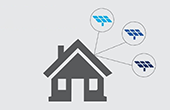South Carolina’s beautiful beach weather makes for more than just luxurious summer vacations – it’s also a great state for solar. Thanks to year-round sunshine and great solar incentives, homeowners in the Palmetto State can save thousands when they install a solar panel system on their roof.
The best way to compare your solar options and save money at the same time is by registering on the EnergySage Marketplace. When you compare quotes for solar panels on EnergySage's competitive solar marketplace, you can expect to see prices up to 20% lower than working with a single solar company. Read our updated article on the cost of solar panels to compare solar costs across states and by panel brand.
What are the best South Carolina solar tax credits and rebates?
With South Carolina solar incentives and rebates, homeowners going solar in the Palmetto State can save thousands on their solar panel installation costs. South Carolina solar shoppers are seeing major 20-year solar when they take advantage of these state and local incentives:
South Carolina solar energy tax credit
Cut the cost of installing solar on your home by a quarter with South Carolina’s state tax credit for solar energy. Residents of the Palmetto State can claim 25 percent of their solar costs as a tax credit – and if you don’t pay enough in taxes to get the full value of the credit in one year, it carries over for up to 10 years.
Utility solar power incentives
Depending on your utility, you might be able to get an additional rebate to cover the cost of your solar panel system, or earn payments for every kilowatt-hour (kWh) of electricity that your solar panels generate. For example, Santee Cooper customers are eligible for a rebate of $1.05/W of solar energy that they install on their roofs, up to $6,300.
South Carolina solar power: the key benefits and incentives
Net metering in South Carolina
If you decide to go solar, net metering is an important policy to understand. Like many other states, South Carolina has a net metering policy that lets homeowners with solar energy systems “bank” the extra electricity their solar panels produce – when you need more power than you’re generating, you can use your credits to make up the difference.
Check out the top utility net metering programs in South Carolina:
The federal solar tax credit
Don’t forget about federal solar incentives! With the investment tax credit (ITC), now referred to as the Residential Clean Energy Credit for residential systems, you can reduce the cost of your PV solar energy system by 30 percent. Keep in mind that the ITC applies only to those who buy their PV system outright (either with a cash purchase or a solar loan), and that you must have enough income for the tax credit to be meaningful (unless you’re a tax-exempt entity, in which case you might be eligible for a direct payment).









